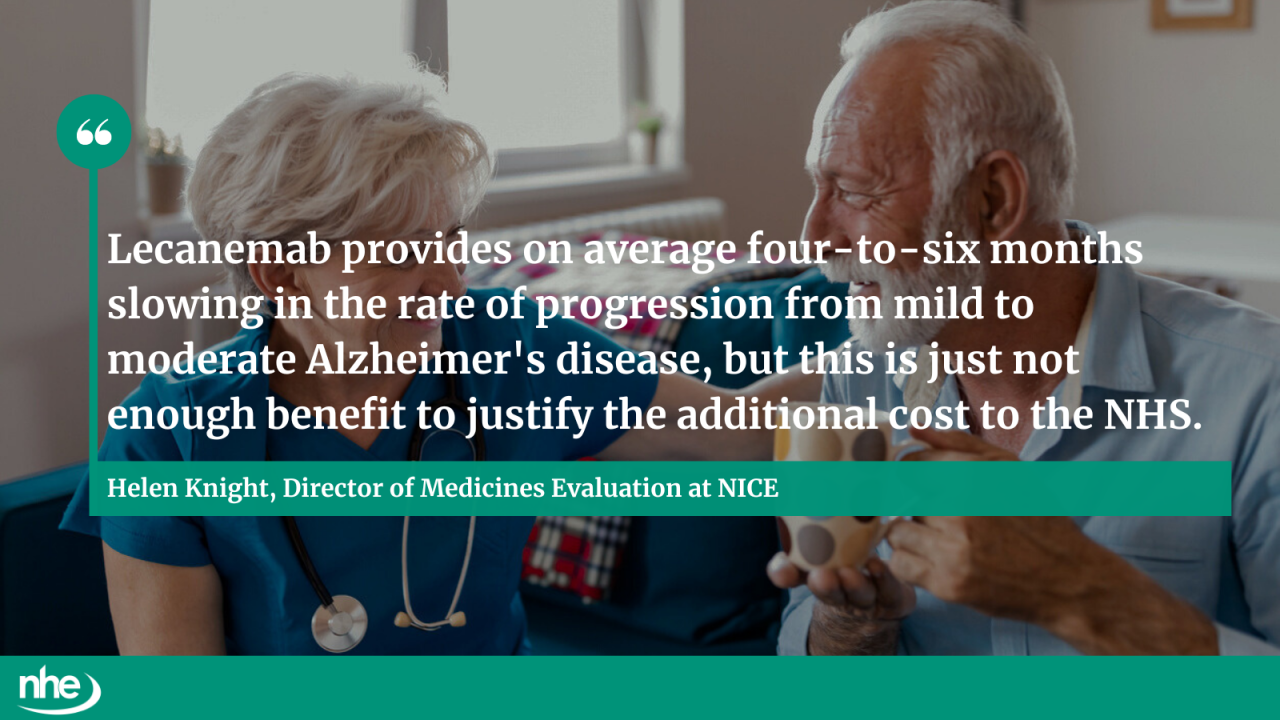A new Alzheimer’s disease treatment that slows down the effects of dementia which has been licensed today by the Medicines and Healthcare products Regulatory Agency (MHRA) has not been recommended for NHS use by the National Institute for Health and Care Excellence (NICE) due to the drug not being cost-effective enough given the health service’s limited funding.
Lecanemab, which is manufactured by Eisai and sold as Leqembi, is the first medicine to be licensed in the UK that can slow down progression of Alzheimer’s disease – by around four-to-six months. Great Britain has also become the first country in Europe to authorise the medicine.
Not good value for money
Despite the ground-breaking nature of the drug, NICE’s independent committee concluded that the costs of providing the treatment, which include fortnightly infusions and intense monitoring for side effects, combined with the “relatively small benefits it provides to patients” mean the watchdog cannot recommend it for NHS use as it is not good value for the taxpayer.
The list price for Leqembi in the United States is around $26,500 per year, which comes in at just under £20,200.
NICE also says that, because the available clinical trial evidence only included reported outcomes after 18 months of taking the drug, there is a lack of data on long-term effects.
“Lecanemab and other similar treatments for Alzheimer’s disease now coming on stream have prompted a great deal of debate about the prospects of being able for the first time to slow the effects of a condition that is progressive, life-limiting, complex and distressing,” said Helen Knight, NICE’s director of medicines evaluation.
She added: “For NICE to be able to approve a medicine for use in the NHS it must not only provide benefits to patients, but it must also represent a good use of NHS resources and taxpayers’ money.
“Lecanemab provides on average four-to-six months slowing in the rate of progression from mild to moderate Alzheimer's disease, but this is just not enough benefit to justify the additional cost to the NHS.”

Dr Samantha Roberts, NICE’s CEO, echoed this sentiment. She commented: “This is a new and emerging field of medicine which will no doubt develop rapidly. However, the reality is that the benefits this first treatment provides are just too small to justify the significant cost to the NHS.
“It is an intensive treatment to give to patients involving a hospital visit every two weeks with skilled staff needed to monitor them for signs of serious side effects, plus the cost of purchasing the drug.
“Our independent committee has rigorously evaluated the available evidence, including the benefit for carers but NICE must only recommend treatments that offer good value to the taxpayer.”
NICE says it examined:
- Research trial evidence
- Real world data
- Testimony from patient representatives and their carers
UK health system not ready?
The draft guidance is open for consultation from today until 20 September – a second committee meeting will take place later this year to determine final recommendations.
Alzheimer’s disease is the most common form of dementia, impacting six in every 10 people with the condition in the UK.
A report commissioned by the Alzheimer’s Society indicated that the cost of dementia is forecast to be £42bn this year, with that figure set to more than double to £90bn by 2040. It also estimated that there are 982,000 people living with dementia in the UK, which is also expected to rise by 2040 – to 1.4 million. The NHS in England is also reporting record levels of dementia diagnoses.
NICE says the treatment would have benefitted around 70,000 adults in the UK.
Responding to the news, Alzheimer’s Research UK’s CEO, Hilary Evans-Newton, said: “There are now more than 160 trials underway testing over 125 experimental treatments for Alzheimer’s across the globe, including 30 in late-stage trials. Despite today’s frustrating news, it really is a matter of when, not if, new treatments become available.”
Evans-Newton added: “It’s a remarkable achievement that science is now delivering licensed treatments that can slow down the devastating effects of Alzheimer’s, rather than just alleviating its symptoms. However, it’s clear our health system isn’t ready to embrace this new wave of Alzheimer’s drugs.”
NHS England's national medical director, Professor Sir Stephen Powis, said: “Lecanemab is the first disease modifying treatment for Alzheimer’s disease with a market approval in the UK, and to ensure the health system is prepared for future advances in treatments, a dedicated NHS team is also looking ahead to 27 other drugs which are currently in advanced clinical trials that could be potentially approved by 2030.”
The Scottish Medicines Consortium is not expected to make a decision on the treatment until next year.
Image credit: iStock



















